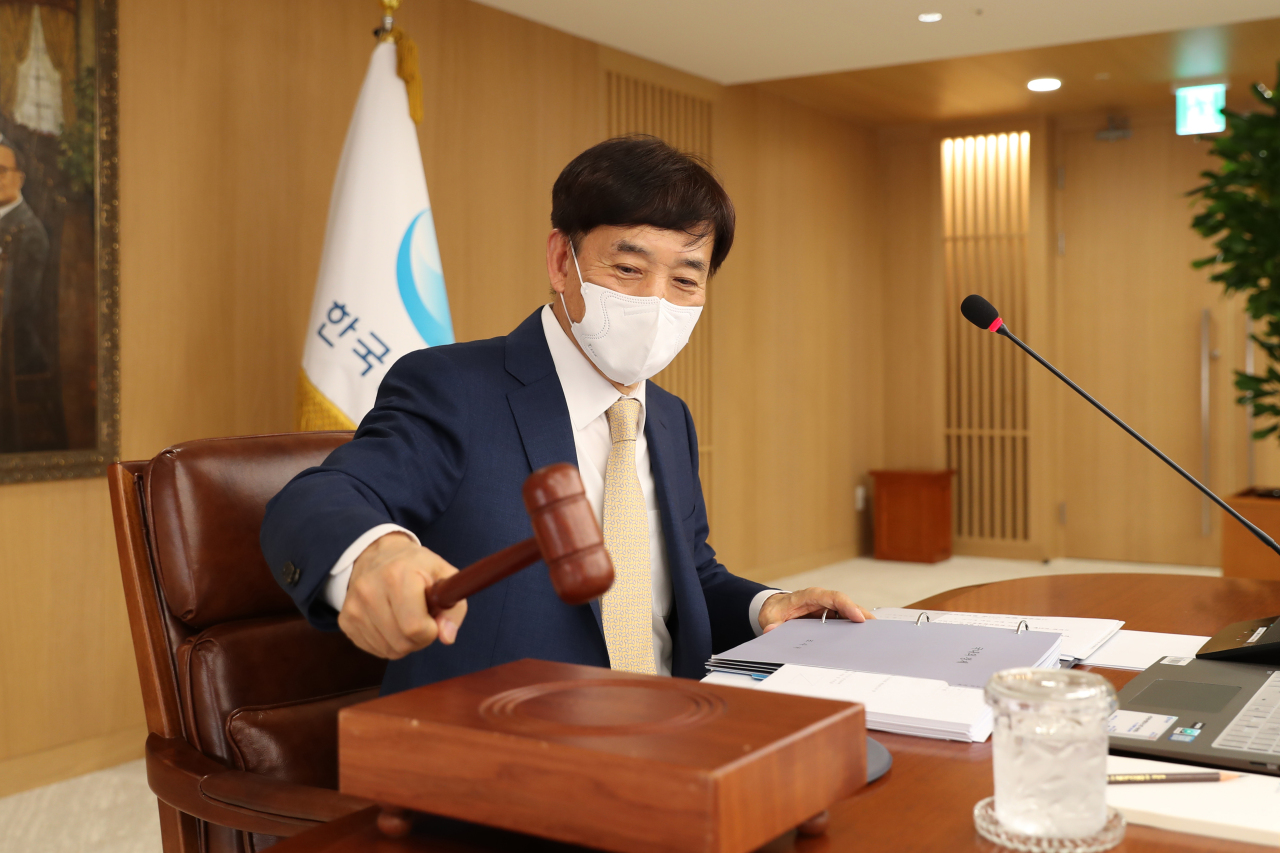 |
BOK Gov. Lee Ju-yeol attends a monetary policy board meeting held at the central bank headquarters in Seoul on Thursday. Yonhap |
In a largely anticipated move, South Korea’s central bank on Thursday decided to hold its policy rate at a record-low of 0.5 percent while casting bleaker projections for this year’s gross domestic product growth rate.
The Bank of Korea’s seven-member monetary policy board unanimously voted to keep the rate frozen at the rate they had slashed by 25 basis points in May to minimize economic fallout from the coronavirus pandemic. The decision in May came two months after the board cut the rate by a whopping 50 basis points to 0.75 percent.
BOK Gov. Lee Ju-yeol noted that the Korean economy currently faces high uncertainties and highlighted the need to maintain a dovish stance “until the economy shows signs of recovery by putting the coronavirus risks behind us.” The country’s monetary policy chief also hinted that the current rate would be frozen for some time, reiterating that the rate is close to the effective lower bound. If the situation calls for further monetary policy moves, the BOK will utilize other measures such as loans or open market operations.
The effective lower bound is the point beyond which further monetary policy in the same direction is counterproductive.
Due to high uncertainties, Asia’s fourth-largest economy’s GDP growth rate is projected to contract more than 0.2 percent, the monetary policy board said in a statement. The board’s earlier forecast in late May said the economy would contract by 0.2 percent on-year by the end of the year, under the favorable conditions that global COVID-19 cases would peak in the second-quarter then noticeably plunge in the second-half of the year.
“The country’s exports have plunged more than expected and there were major changes in the situation since the last forecast,” Lee said in a press briefing tied to the rate decision.
“The spread of the virus has been only gaining momentum as of second week of July, defying previous expectations that it would settle down starting June … the fate of the global economy is now in the hands of the virus,” he added.
But Lee also remained hopeful saying that he has “expectations” that the situation would not spiral into a worst-case scenario.
Experts have largely projected Thursday’s rate freeze, citing the BOK’s cautious steps to avoid further aggravation of the nation’s heated real estate market, but Lee drew between the central bank’s monetary policies and the Moon Jae-in administration’s real estate measures.
“We have not made the rate freeze decision by taking the housing market situation into consideration,” he said.
But Lee expressed support for the measures, saying that the latest policy moves expressed the government’s strong will to pacify the local property market, which has been rattled by anticipations that housing prices would spike on the back of the improved COVID-19 situation here.
“The policy will be effective in controlling multiple-property owners’ speculative buying,” Lee said.
“The strong measures have placed a cap on the possibility of further surge in housing prices.”
The Moon administration has been scrambling to resolve the nation’s housing supply shortage through a chain of more than 20 policy actions, focused on levying heavier tax on multiple property owners. Officials believe the heavier tax would push the owners to sell-off their surplus properties.
By Jung Min-kyung (
mkjung@heraldcorp.com)








